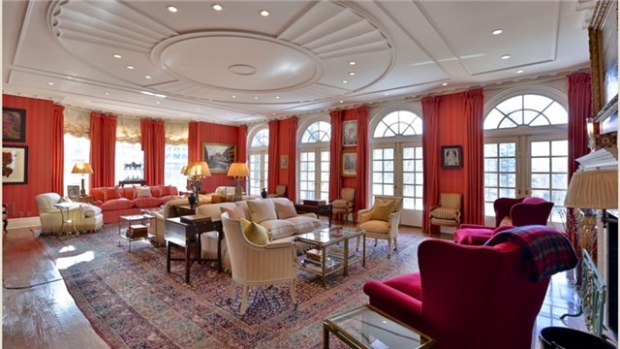German Real Estate Firm Adler Reaches Agreement With Lenders
Troubled German real estate firm Adler Group SA has reached a non-binding agreement with bondholders, according to a company statement released on Thursday morning.
Latest Videos
The information you requested is not available at this time, please check back again soon.
Troubled German real estate firm Adler Group SA has reached a non-binding agreement with bondholders, according to a company statement released on Thursday morning.
The deep freeze that’s gripped Europe’s real estate markets since borrowing costs jumped worsened at the start of the year as deals plunged to their lowest levels since 2011.
Investors are looking for the next policy domino to fall in Asia amid an escalating campaign against a resurgent dollar, after Indonesia used a surprise interest rate hike to defend the rupiah.
Vietnamese billionaire Pham Nhat Vuong pledged to invest at least another $1 billion of his personal wealth into VinFast Auto Ltd., providing the capital needed for expansion of the struggling electric vehicle maker.
Macrotech Developers Ltd., a real estate firm that operates under the brand name Lodha, expects pre-sales to grow about 20% in the year to March after reporting its highest ever quarterly revenue.
Jun 15, 2016

The Canada Revenue Agency says it placed liens on Conrad Black’s Toronto mansion because it believed the former media magnate could skip the country without paying $31-million in tax debts to the Canadian and U.S. governments.
Documents filed in Federal Court proceedings related to the liens reveal that Mr. Black, who gave up his Canadian citizenship to sit in the British House of Lords, has little money left in his Canadian bank accounts and has made no attempt to renew a temporary residence permit that expires in September.
The documents say that Mr. Black, who has sold all his property in the United States and Britain, has refused to provide a bank letter of credit to secure his income tax debt on the sale of his Toronto mansion at 26 Park Lane Circle.
“It is open to Black, and would be relatively easy to move his funds, including liquidated equity from Park Lane, offshore and relocate abroad at any time, thereby jeopardizing the collection of his tax,” the revenue agency said.
Mr. Black owes $12.3-million in taxes to the Canadian government and US$19.3-million to the U.S. tax department, according to the documents. As of March 11, 2016, he had balances of $38,900 and US$6,834 in his Canadian bank accounts, despite large lump-sum payments made to him over the previous two years.
Federal Court Justice Denis Gascon agreed with the agency in a May 5 ruling that there were “reasonable grounds to believe” Mr. Black would “waste, dissipate, liquidate or otherwise transfer his assets so as to become less able to pay the tax amounts assessed.”
Mr. Black’s lawyer, David Nathanson, denied his client has any plans to leave Canada.
“The suggestion is ridiculous because he has no intention of leaving the country,” Mr. Nathanson told The Globe and Mail. “If he is ejected from the country that is another story, but he has no intention of leaving the country.”
Mr. Nathanson acknowledged Mr. Black faces financial difficulties, but he insisted his client plans to apply for permanent residency and eventually his Canadian citizenship.
Mr. Black’s lawyer said in court that Mr. Black’s spouse, the writer Barbara Amiel-Black, has “commercial assets of substantial value which she expects to continue to appreciate and she is disposed to deploy, if necessary, to assist Mr. Black in discharging his liabilities.”
The revenue agency said Mr. Black’s lawyer failed to provide supporting evidence to show the wealth of Ms. Amiel-Black.
In court, the agency said it “does not know if any corporations controlled by Black, including Conrad Black Capital Corporation, have offshore bank accounts.” Mr. Nathanson said his client does not have offshore accounts.
The court documents say the Canadian bank accounts of Conrad Black Capital, which Mr. Black indirectly owns, indicate that the majority of the funds there appear to be used for Mr. Black’s personal expenses. Those accounts showed a loss of $3.3-million on their income statements and a deficit of $2.7-million on the balance sheet.
The documents also show an unusual arrangement in the sale of Mr. Black’s mansion, which is now on hold. The undisclosed price was $14-million, which was $5-million less than an appraisal commissioned by Canada Revenue Agency.
Revenue investigator Jon-Paul Rebellato said in the court documents that the unnamed buyer agreed to lease the mansion back to Mr. Black at an annual rent of $155,000. The sale included a verbal agreement with the purchaser to give Mr. Black 50 per cent of the proceeds of any future sale of the property.
Mortgages on the 23,000-square-foot house, nestled on 6.6 acres, amount to $13-million.
“Once the mortgages and other encumbrances on the Park Lane property are paid, it is estimated that less than $1-million in equity will remain from Mr. Black’s most valuable asset, and there are reasonable grounds to believe that the proceeds of the sale of this asset will no longer be available to satisfy” the tax debt, the court documents said.
In 2014, Mr. Black had $1.1-million in the British Caribbean Bank, but that balance is now zero, the documents say. His shares in Postmedia, once valued at $491,028, have fallen to $56,416. Between 2004 and 2010, he sold homes he owned in the United States and Britain for about $46-million. The court documents do not indicate where that money ended up.